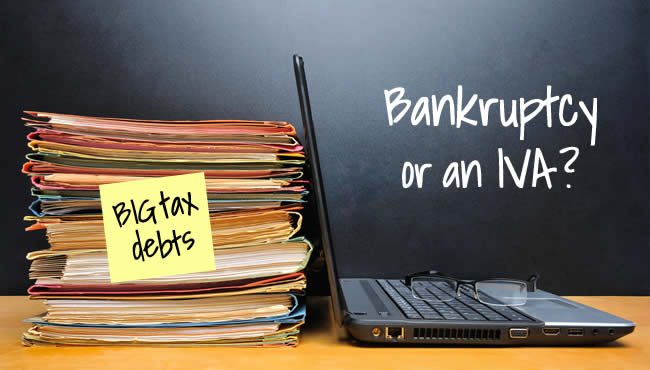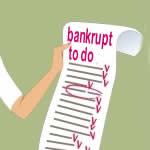A reader asked:
I’m thinking about an IVA. I’ve got 8k of credit card debt and overdrafts but I owe a lot of income tax and VAT. Probably a lot over 20k but I haven’t filled out any tax returns for years. Do I have to get the exact tax owed when applying for an IVA? I don’t think I can cope with all that.
I was self employed but I now have a job, not well paid. I’m now living with my parents and don’t even own a car, so should I just go bankrupt instead?

Would an IVA be approved?
An IVA firm will want the debts listed on the proposal to be as accurate as possible. That applies to all debts, but there are some important extra points when HMRC is a creditor
Before an IVA starts, it has to be approved by 75% of your creditors by value who vote on the IVA. If you think of all your creditors having one vote for every pound you owe them, then three-quarters of the votes cast have to be to accept your IVA proposal.
Because the reader owes so much to HMRC, they may well have a veto on his IVA proposal. HMRC is very likely to vote against any IVA proposal if there are any outstanding returns. So if the reader wants an IVA he has to submit his previous years’ tax returns beforehand.
Even if the tax returns are up to date so the figures in the IVA proposal are accurate, HMRC may still vote against it.
An IVA firm should be able to say from their experience if HMRC is likely to accept the amount being offered. Sometimes HMRC will insist on the IVA being extended to six years, not five.
If HMRC is likely to object, the reader may decide it’s not worth taking months to get his tax affairs in order only for the IVA to be rejected. It may be better (simpler, quicker) to go for bankruptcy.
Do the missing tax returns matter in bankruptcy?
If the reader decides to go for bankruptcy, then the bankruptcy application can go in without accurate numbers – this won’t stop the bankruptcy being approved. Even if a debt is missed off a bankruptcy application, it is still included in the bankruptcy.
The only problem for bankruptcy is that the Official Receiver may decide that the reader should get a Bankruptcy Restriction Order (BROs) because he has neglected his business, causing his tax debts to increase. This following type of wording is quite common on BROs:
Mr X failed to submit self assessment income tax returns on time between [date] and [date]. No payments were made by Mr X in respect of self assessment. HMRC are Mr X’s principal creditor and have submitted a claim in the bankruptcy of £n, which has materially contributed to his insolvency.
If the reader completed his tax returns before going bankrupt, that may reduce the likelihood of a BRO, but it would still be a possibility as the returns were late and he still wouldn’t have made any payments to them.
As the reader is not now self-employed, he may not care about a BRO because it may make little difference to him. A BRO will not increase the time he has to make monthly payments if he is one of the few people who has to pay an IPA (only about 1 in 8 people do in 2022). And an IPA is only for 3 years, not 5 or 5 years of IVA payments.
So IVA or bankruptcy?
Nothing the reader said suggests that an IVA is a better idea, but it’s always worth discussing the decision to go bankrupt in detail with an expert. For people who are self-employed, a good choice is to talk to Business Debtline to look at the possible options.
What if your business was still going?
If you want to carry on with your business, your situation would be very different from the reader’s case This can change the decision between an IVA and bankruptcy, depending on things like whether your business may need any credit.
Again Business Debtline is the best place to get advice on whether an IVA or bankruptcy is better for you.
Here you have to get those back tax returns done and start keeping on top of the accounts from here on, whatever you decide to do about the debts. LITRG has some good pages on tax for the self-employed. Of course the business has to be profitable when you are paying the correct taxes.



Jane Clack says
This is why you always need to go through a detailed financial statement with a reputable organization before making any decision!
Michael Peoples says
It is a tricky one as we never know whether HMRC will accept or reject before they submit their proxy. As you rightly say Sarah, HMRC will reject if the paperwork is not up to date and proposing an IVA in these instances is futile [unless HMRC have a small vote]. We always advise the debtors to get their paperwork in order but point out that this alone will not guarantee success and could be a costly and pointless exercise.
I have had situations where all paperwork has been submitted prior to a meeting of creditors and HMRC have rejected due to poor previous compliance and non disclosure. I have tried to argue with HMRC that the debtor has only now come forward because of our advice and full disclosure now is better than continuing on under the radar. Sometimes this has worked and sometimes it has not but at least going forward the debtor can stop looking over their shoulder fearing the worst.
SG says
How long will HMRC chase a tax debt?
We have overpaid child tax credit debt from 2013/14 ( 6k), it went to a debt agency who at that I was in a bankruptcy order and other debts in a DMP. The debt collector returned the debt to HMRC stating no viable solution to repay the debt.
Will this debt simply go away after 6 years or will they come back and ask for payment?
Sara (Debt Camel) says
“at that I was in a bankruptcy order and other debts in a DMP.” not sure what this means? i am wondering if one of you was bankrupt and the other in a DMP … in which case the debt would not have been written off. But more information is needed.
Michael Peoples says
If you were bankrupt the debt would have been included and written off at that time. HMRC cannot come back and reclaim it as they are the same as any other creditor.
Sara (Debt Camel) says
i am wondering if one of the couple was bankrupt and the other in a DMP … in which case the debt would not have been written off. But more information is needed.
SG says
Hi
Sorry for the confusion
I was already in bankruptcy when the HMRC stayed they had overpaid tax credits.
We had some newer debts placed in a DMP ( Debt Management Plan). HMRC sold the debt to a debt collector in 2014.. as soon as they saw we had no disposable income they passed the debt back to HMRC stating no viable means to pay back debt.
That was in 2014 and nothing since from HMRC
Thanks
Michael Peoples says
If the debt existed at the time of the bankruptcy order then you should have nothing to worry about. Contact the case officer who dealt with your bankruptcy and see if HMRC submitted a claim which will be all the evidence you need. If the tax credit overpayment was a joint liability it would only be yourself who is protected as the other party would be held liable for the debt. My instinct says you are fine otherwise you should have heard something from HMRC by now.
Sara (Debt Camel) says
It isn’t clear what has happened here. HMRC will sometimes write off a debt (the term they use is “remit”) but you would normally have been told if that had happened.
If the debt was included in your bankruptcy that won’t help as your partner would still be liable.
HMRC have a 6 year limitation period after which they couldn’t go to court to collect the debt. But they can deduct amount from any tax credits you are receiving after this.
In this sort of situation I would say there is little advantage in trying to find out what has happened to the debt. I suggest your best plan is to repay your other debts as fast as possible, so if this one ever re-emerges, you are in a better position to repay it.
D Smith says
If you do choose to go for an IVA please do NOT choose Grant Thornton for your IP. They have been an absolute NIGHTMARE. They are STILL chasing/hounding me 6 years AFTER a successful completion with another IP. I have NO peace of mind -and actually?? Thanks Money, Debt and Credit for selling my details onto them without my permission or knowledge. I would avoid BOTH Companies but do wish you the very best of Luck in getting debt free.
AliceE-H says
SG.
Contingent debts are written off in bankruptcy. So if you were ever chased for this overpayment it could be worth checking if this applies. HMRC will often halve the liability for tax CREDIT debts (about the only creditor who will).
If your partner goes insolvent at any point he should obviously include it.
HMRC. have a lot of discretion on how to treat tc debt, especially with hardship or vulnerability.
But the golden rule is that if they aren’t chasing you, do not stick your head over the parapet by contacting them about it.!
Adam says
I went self employed last year and I had great credit, I had to set up my buisness at the wrong time as I was laid off from my full time job which was paying for the equipment, amongst other things I’ve ended up in around 40k worth of debt.
I’m managing to meet the mo they payments as the business is doing ok but every month is a massive struggle! It’s always down to the final week and I get the money!
Since I’ve gone self employed my credit has gone I can’t even get a balance transfer card and I’ve never missed a payment!
How will my credit improve because at the moment I honestly feel it’s better to take an Iva and the £1100 a month I was paying on debts can go in a savings account, obviously I will pay whatever the Iva is….. I just don’t see the point anymore as I’ve alre got rubbish credit from going self employed I may aswell take an Iva still have bad credit but be better if financially and it will lift a burden of my family’s shoulders!! I’m sick of thinking about it all the time
Sara (Debt Camel) says
You won’t be able to save in an IVA… all your “spare” income goes into the IVA.
I can’t tell why your credit has dropped. If it’s just because your cards are maxed out, then as you pay them off slowly your credit score will improve.
Ermilindo Petrosillo says
I have been in an iva for 14 months and hmrc have said I owe them money I have informed my ip on the matter do I have to pay back tax on an iva as this is another debt
Sara (Debt Camel) says
Which year do you owe HMRC for?